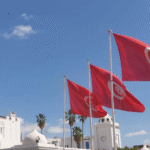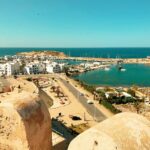Tunisia is an increasingly attractive destination for expatriates, retirees, and investors due to its affordable real estate, Mediterranean climate, and welcoming residency policies. Whether you’re looking to buy a house, villa, or apartment, understanding the costs, legal procedures, and benefits is crucial.
This guide covers:
- Property prices in Tunisia (houses, villas, apartments)
- Legal procedures for property registration
- Residency card requirements
- Pathway to Tunisian nationality through real estate investment
- Benefits of living and retiring in Tunisia
- Cost of living comparison with Europe
1. Property Prices in Tunisia
Houses, Villas, and Apartments: Average Costs
Tunisia offers a wide range of property options at competitive prices compared to Europe.
Apartments
- Tunis (Capital): €1,000 – €3,000 per m² (luxury areas like La Marsa and Gammarth)
- Sousse, Hammamet: €800 – €2,500 per m²
- Djerba, Sfax: €600 – €1,500 per m²
Houses & Villas
- Tunis (suburbs): €150,000 – €500,000
- Coastal areas (Hammamet, Sousse): €200,000 – €800,000
- Inland cities (Kairouan, Tozeur): €50,000 – €200,000
Prices vary based on location, amenities, and proximity to the coast.
2. Legal Procedure for Buying Property in Tunisia
Step 1: Find a Property & Negotiate
- Work with a registered real estate agent or search listings online.
- Verify ownership via the Land Registry (Conservation Foncière).
Step 2: Sign a Preliminary Agreement (Compromis de Vente)
- A 10% deposit is usually required.
- The agreement outlines the sale terms.
Step 3: Obtain Authorization (For Foreigners)
- Non-Tunisians need approval from the Ministry of Foreign Affairs (for agricultural land) or local authorities (for urban properties).
Step 4: Finalize the Sale (Acte Authentique)
- A notary drafts the final deed.
- Registration fees (1% of property value) and notary fees (1-2%) apply.
Step 5: Register the Property
- The deed is registered at the Land Registry (Conservation Foncière).
- Property tax (0.5% annually) applies.
3. Obtaining a Residency Card in Tunisia
Types of Residency Permits
- Temporary Residency (1 year, renewable)
- Requires proof of property ownership or rental agreement.
- Financial means (€500–€1,000/month).
- Permanent Residency (5+ years)
- After continuous temporary residency.
- Retirement Residency
- Proof of pension (minimum €700/month).
Required Documents
- Passport copy
- Property deed or rental contract
- Proof of income
- Medical certificate
- Criminal record check
Processing time: 1–3 months.
4. Tunisian Nationality Through Real Estate Investment
Investment Requirements
- Minimum investment: €300,000 in real estate (residential or commercial).
- Hold the property for at least 5 years.
- Apply for naturalization after legal residency.
Benefits of Tunisian Citizenship
- Visa-free travel to Africa & Arab countries
- Dual citizenship allowed
- Access to healthcare & education
5. Benefits of Living in Tunisia
Affordable Cost of Living
- Rent: €300–€800/month (vs. €1,500+ in Europe)
- Groceries: 50% cheaper than Europe
- Dining out: €5–€15 per meal
Climate & Lifestyle
- Mediterranean weather (300+ sunny days/year)
- Low crime rates (safer than many European cities)
- Rich culture & history
Healthcare
- Public hospitals: Free/low-cost
- Private clinics: High quality, 50% cheaper than Europe
6. Retiring in Tunisia: Why It’s Ideal
Tax Benefits
- No tax on foreign pensions (for 10 years under certain conditions).
- Low property taxes (0.5% annually).
Expat Communities
- Large retiree communities in Hammamet, Sousse, Djerba.
- English/French widely spoken.
Slow-Paced, Relaxed Lifestyle
- Beachfront living at half the cost of Spain or Portugal.
7. Cost of Living Comparison: Tunisia vs. Europe
| Expense | Tunisia (€) | Europe (€) |
|---|---|---|
| Rent (1-bed apartment, city center) | 300–500 | 800–1,500 |
| Utilities (electricity, water, gas) | 50–100 | 150–300 |
| Groceries (monthly) | 150–250 | 300–500 |
| Dining out (per meal) | 5–15 | 15–30 |
| Public transport (monthly pass) | 10–20 | 40–80 |
Tunisia is 50–70% cheaper than most European countries.
Conclusion
Buying property in Tunisia is a smart investment for expats, retirees, and investors. With low property prices, simple residency procedures, and a high quality of life, Tunisia stands out as a top destination.
Whether you seek permanent residency, citizenship, or a retirement haven, Tunisia offers affordable living, tax benefits, and Mediterranean charm—making it a better alternative to Europe for many.
Interested in moving to Tunisia? Consult a local real estate expert to start your journey today!



